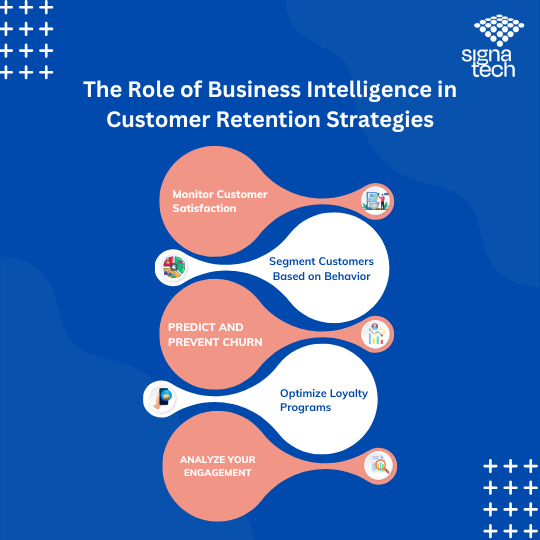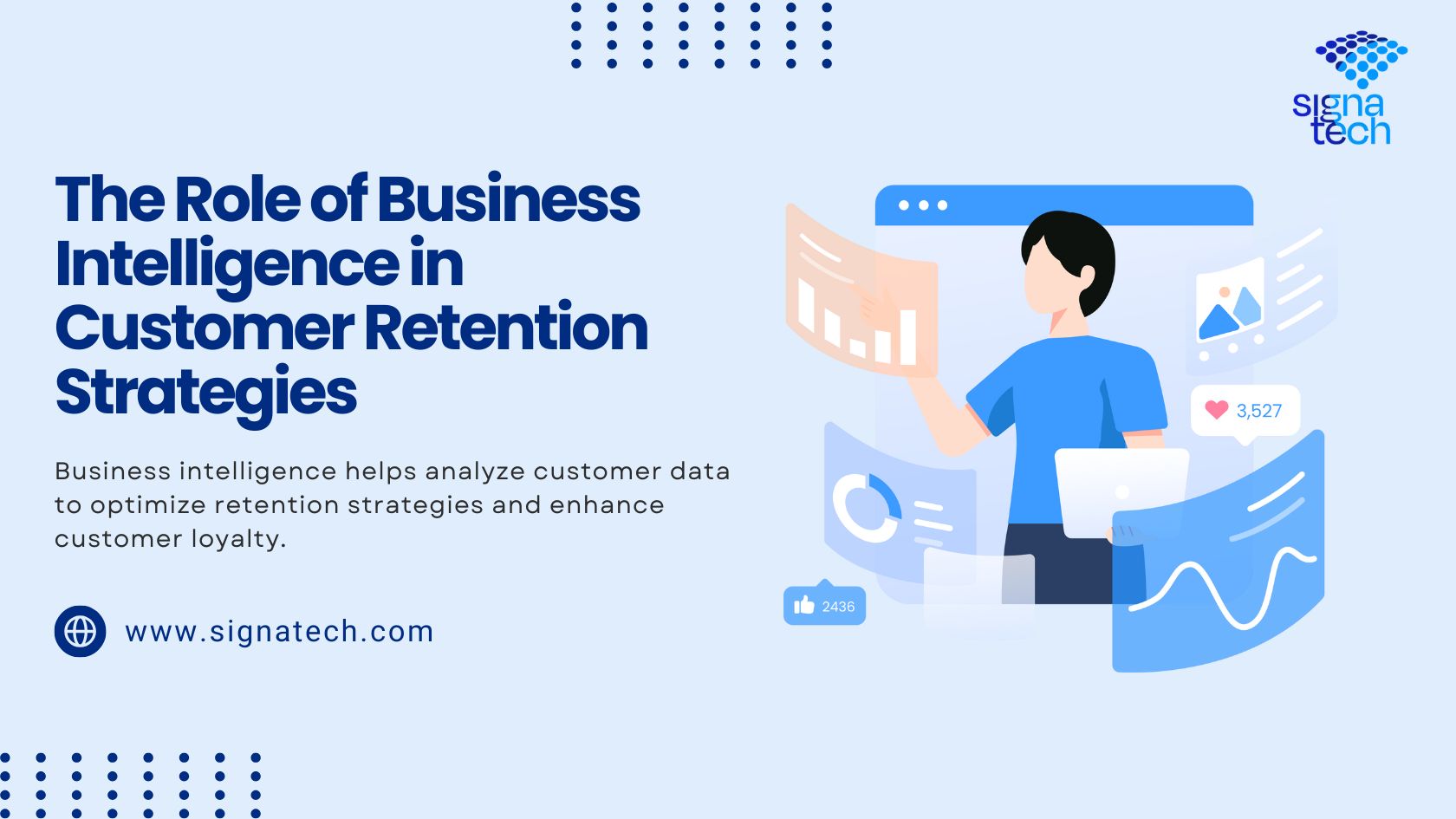In the current world of cut-throat competition, customer retention is the key to success in any business. Customer retention is a fundamental component of the growth and profitability of a firm and therefore requires proper strategies that will ensure customers remain loyal to a firm. Since customers’ expectations are constantly changing, retaining them is a challenge that organizations have to face depending on their knowledge of customers’ behavior and their preferences.
This is where business intelligence comes in handy. BI assists organizations in collecting and processing large amounts of information to find patterns. These insights help companies tailor services to customer expectations, anticipate their needs, and solve potential problems, which will enhance customer satisfaction and increase retention levels. With the use of Business Intelligence for Customer Retention tools, businesses can make the right decisions that will lead to long-term customer loyalty.
Understanding Customer Retention
Customer retention is a marketing strategy that focuses on maintaining client loyalty to a brand or business in the long term. It is not just about closing a deal but about creating a bond with the customer that will make him or her come back for more business. Customer loyalty is a valuable asset because such customers give more revenue to a company than those who are new in the market. Gaining a new client costs much more than retaining an existing one, and this is due to the amount of resources used in marketing and selling. Further, existing customers are willing to refer others, which makes the business cycle continuous and generates the organization’s revenues.
This is where Business Intelligence for Customer Retention becomes crucial. It helps businesses analyze customer data, predict behavior changes, and identify potential churn risks. This is especially good for the business side of things as it’s cheaper to retain customers than to constantly search for new ones. But customer retention is not without its difficulties. The problem of customer engagement is that customers are changing their behavior, the competition is growing, and there is a threat of customer churn. These challenges show the need to come up with appropriate customer retention techniques that enable a business to succeed in the long run.
The Role of Business Intelligence in Customer Retention Strategies

Customer retention is an area where Business Intelligence or BI is instrumental in transforming data into information that can be acted upon. BI tools compile information from sources such as customer relationship management and purchase histories, to gain a rich insight into customer buying patterns.
Using such data, businesses are able to forecast customer demands, analyze the level of interaction, and even avoid customer attrition. Business Intelligence for Customer Retention also helps in the differentiation of customers and thus the development of marketing strategies that appeal to various classes of customers. This way, businesses can target appropriate offers and messages, and develop better and longer-lasting relationships with their customers.
If you want to know more about business intelligence, read more about Self-Service Business Intelligence in our blog. Now, let’s explore more about the Role of Business Intelligence in Customer Retention Strategies.
1. Segment Customers Based on Behavior
- Strategy: Organize customers into categories by the use of BI tools in terms of their buying patterns, choices, and transactions. It enables you to communicate as well as offer different products to different groups based on their needs and behavior.
- Benefit: Customers are more likely to stay and this is because personalization is likely to help increase customer satisfaction.
2. Predict and Prevent Churn
- Strategy: Use big data to establish a customer risk profile. This means tracking engagement rates, purchase rates and interaction patterns in order to predict customer attrition.
- Benefit: When you are able to identify potential customers who are likely to leave your company, you can then try to address them in a special way, for instance through offering them attractive offers, discounts or even special customer care services in order to avoid high churn rates.
3. Monitor Customer Satisfaction
- Strategy: Business Intelligence for Customer Retention can be used in the analysis of customer satisfaction information that may be obtained from surveys, social media, and support. Check customer satisfaction from time to time so that you can know their feelings towards the business.
- Benefit: Being able to see where customer satisfaction is falling means that the problems can be addressed immediately, and customers can be kept happy and loyal.
4. Enhance Customer Support with Data
- Strategy: Understand issues that can be addressed by customer support in order to find out which issues are the most frequent and how they can be solved better. BI can be used to enhance the flow of operations of customer service and increase the quality of support offered.
- Benefit: Better customer satisfaction means less customers churn due to unsolved problems.
5. Optimize Loyalty Programs
- Strategy: BI should be used to monitor and evaluate the effectiveness of your loyalty programs. Determine which rewards and incentives motivate consumers and encourage repurchase, and adjust the program accordingly.
- Benefit: Optimized loyalty program retains the customer and keeps them interested in the business.
6. Personalize Marketing Campaigns
- Strategy: Use Business Intelligence for Customer Retention to segment the customers and analyze their buying habits and preferences to develop marketing messages. Market your products and services better to specific segments of the customers for better responses.
- Benefit: Targeted campaigns are preferred by customers, hence there is a high likelihood of making repeat sales and building customer loyalty.
7. Identify Upsell and Cross-Sell Opportunities
- Strategy: Implement BI tools to review clients’ information and find out more sales and related products based on their prior purchase. Provide relevant product suggestions or additional services.
- Benefit: Besides, it helps to increase the revenue, as well as strengthens the customer bond, which will result in the customer patronizing the brand more.
8. Track Customer Lifetime Value (CLV)
- Strategy: Business Intelligence for Customer Retention tools can assist you in calculating and tracking Customer Lifetime Value (CLV), the amount of money a customer spends with your business throughout the time they remain your customer. The next strategy is to direct the retention efforts towards customers who have a high CLV by availing special services to them.
- Benefit: Focusing on such customers guarantees sustainable revenues and improved customer retention rates.
9. Use Real-Time Data for Immediate Action
- Strategy: Use BI to get updated information on the customers. Create a notification for any shifts in the engagement or satisfaction levels so that the team can address the issue.
- Benefit: If the customer’s needs or complaints are addressed immediately, then satisfaction levels are likely to increase and they will not leave.
10. Measure the Impact of Retention Strategies
- Strategy: Regularly track the efficiency of the customer retention strategies with the help of Business Intelligence for Customer Retention tools, employing customer retention rate, customer satisfaction index, and repeat purchase ratio as the primary KPIs.
- Benefit: This way, the evaluation and management of retention processes are done more frequently, leading to better customer loyalty results each time.
In conclusion, business intelligence has a central role in improving customer retention techniques because it offers the business important information about customers that can be used to formulate techniques that are effective in making customers loyal. With the help of Business Intelligence Consulting Services that are provided by Signatech, companies can target individual customers, anticipate customer attrition, and make profitable decisions about customers. In the long run, business intelligence when effectively implemented also enhances the customer relations hence customer loyalty that is good for the long run business and market competitiveness.
